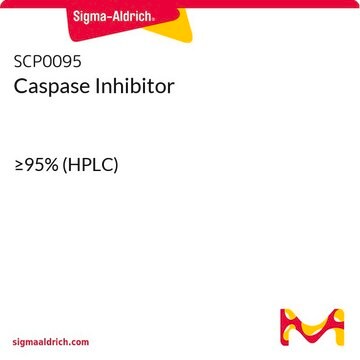B2682
Boc-Asp(OMe)-fluoromethyl ketone
≥90% (TLC), solid
Synonym(s):
Boc-D-FMK
Sign Into View Organizational & Contract Pricing
All Photos(1)
About This Item
Empirical Formula (Hill Notation):
C11H18NO5F
CAS Number:
Molecular Weight:
263.26
MDL number:
UNSPSC Code:
12352209
PubChem Substance ID:
NACRES:
NA.77
Recommended Products
Quality Level
Assay
≥90% (TLC)
form
solid
solubility
DMF: soluble
storage temp.
−20°C
SMILES string
COC(=O)C[C@H](NC(=O)OC(C)(C)C)C(=O)CF
InChI
1S/C11H18FNO5/c1-11(2,3)18-10(16)13-7(8(14)6-12)5-9(15)17-4/h7H,5-6H2,1-4H3,(H,13,16)/t7-/m0/s1
InChI key
MXOOUCRHWJYCAL-ZETCQYMHSA-N
Application
Boc-Asp(OMe)-fluoromethyl ketone (Boc-D-fmk) has been used as a caspase inhibitor to study its effects on lactate dehydrogenase (LDH) leakage, apoptosis and virus proliferation in chorion cells , as a component of the transplantation medium for the transplantation of human embryonic stem cells (ESC)-derived medial ganglionic eminence (MGE) cells into hippocampus of mice , as a protease inhibitor to study its effects on cell death in parasites .
Biochem/physiol Actions
Boc-Asp(OMe)-fluoromethyl ketone (Boc-D-fmk) permits cell permeability. It is a caspase inhibitor and suppresses apoptosis induced by various kinds of stimuli. Boc-D-fmk poorly inhibits caspases-2, -5, -6 and -10.
Signal Word
Warning
Hazard Statements
Precautionary Statements
Hazard Classifications
Eye Irrit. 2
Storage Class Code
11 - Combustible Solids
WGK
WGK 3
Flash Point(F)
Not applicable
Flash Point(C)
Not applicable
Personal Protective Equipment
dust mask type N95 (US), Eyeshields, Gloves
Choose from one of the most recent versions:
Already Own This Product?
Find documentation for the products that you have recently purchased in the Document Library.
Differentiation of human pluripotent stem cells into Medial Ganglionic Eminence vs. Caudal Ganglionic Eminence cells
Ahn S, et al.
Methods, 101(3), 103-112 (2016)
Lactate dehydrogenase leakage as a marker for apoptotic cell degradation induced by influenza virus infection in human fetal membrane cells
Uchide N, et al.
Intervirology, 52(3), 164-173 (2009)
Heat-induced programmed cell death in Leishmania infantum is reverted by Bcl-X L expression
Alzate JF, et al.
Apoptosis, 11(2), 161-171 (2006)
Qiruo Gao et al.
Cell biochemistry and biophysics, 70(1), 461-465 (2014-05-06)
Adiponectin, an adipose tissue-derived hormone, has been studied intensively for the past decade because of its anti-inflammatory, anti-atherogenic, and anti-diabetic properties. Recent advances suggest that adiponectin also plays an important role in the development and progression of various cancers. Accumulating
Broad-spectrum caspase inhibitors: from myth to reality?
Chauvier D, et al.
Cell Death and Differentiation, 14(2), 387-391 (2007)
Our team of scientists has experience in all areas of research including Life Science, Material Science, Chemical Synthesis, Chromatography, Analytical and many others.
Contact Technical Service









